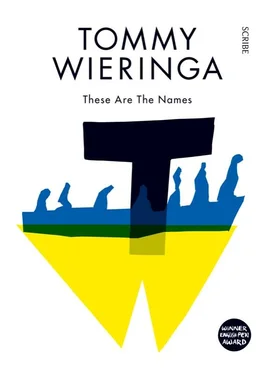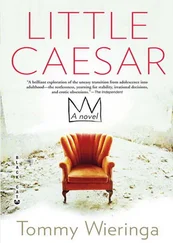He thought for a moment. ‘But personally, as far as I’m concerned … a new high point, or perhaps rather, a new deep point, is imitating a border. And then sending them out onto the steppes, knowing they’re going to perish there. Something like that …’ He shook his head. ‘No, I wouldn’t have thought that was possible.’
The rabbi leaned across the table. ‘Then you have forgotten what Amalek did …’
‘And what was that?’ Beg asked.
The rabbi recited the lines from the Torah:
Remember what Amalek and his tribe did to you along the way when you came out of Egypt. When you were weary and worn out, they met you on your journey and attacked all who were lagging behind; they had no fear of God.
He took a breath and went on:
When the LORD your God gives you rest from all the enemies around you in the land he is giving you to possess as an inheritance, you shall blot out the name of Amalek from under heaven. Do not forget.
‘Amalek attacked us when we were weakest,’ he said. ‘His name is a curse.’
For the rabbi, the past didn’t exist, Beg thought. It was as alive to him as the present; the low tricks of a tribal chieftain in the wilderness were reflected in the treachery of the people-smugglers he had just encountered. The day before yesterday, or three thousand years ago, it made no difference to him.
This mysterious timelessness overcame him, too, when he read about the lives of Moses, Aaron, and Joshua in the desert and knew himself connected to that in some mystical fashion. He was no longer so alone. Others had gone before him, just as others would come after him. Whether he would strap the phylactery to his arm each morning, he didn’t know. But with every word he read and every visit he paid to the rabbi, he sensed — with a certainty that touched him — that he was approaching his destination.
He didn’t know if it was allowed, but even more than to the Everlasting he was drawn at times by the desire to be immersed in the mikveh, the niche of stone deep in the earth, where the living water would renew his soul.
CHAPTER THIRTY-TWO.Akmuhammet Kurbankiliev
When they came to the edge of the city and realised where they were, the poacher began to weep. He couldn’t stop. The woman couldn’t stand to see his sorrow; the tears washed down her cheeks as well. It was like a contagious sickness: they infected each other, they were all crying now, their tears kept flowing. It had all been for naught. All of it. They had crossed the wilderness to a new country, only to discover that it wasn’t a new country at all — only the nightmare of the eternal return.
Right after seeing the boy at the psychiatric hospital, Beg visited the woman there, too. He pulled up a chair beside her bed. He heard three names.
The boy’s name was Saïd Mirza.
‘He told me it was Nacer Gül,’ Beg mumbled.
Nacer Gül, the woman said, was the man who had almost sent them to their death. Nacer Gül with his white BMW and his sunglasses that he wore even at night. Nacer Gül — the betrayer, the faithless one.
She knew Vitaly’s name, and the boy’s, but not those of the others. There had been no call for names.
‘You were already pregnant when you left?’ Beg asked.
A brief glare. She shook her head.
‘Who is the child’s father?’
She kept her eyes averted.
‘You don’t know who the father is?’
When she remained silent, he exhaled through his nose in disgust. ‘Then I see only … three possibilities, am I right?’
But although she told him all about the fake border crossing, Samira Uygun remained silent on two counts: the life inside her, and the death of the black man.
Beg bought cigarettes, a pack of chewing gum, and a couple of bottles of energy drink. He climbed the stairs to the third, because the elevator took forever to travel from floor to floor. Beg mounted, holding the railing with one hand. He needed to do something about the shape he was in, he thought — not for the first time. There was a little gym on the first floor. It was slowly filling up with broken office furniture and crates of empty soda bottles.
In the interrogation room he arranged the things on the table. He put the chewing gum in his inside pocket. He slid the cigarettes and plastic bottles around until he was satisfied. It was no mean feat to make things look as though you hadn’t thought about it.
The toothless man was brought in. Beg tried to estimate his age; he could have been forty, but just as easily fifty-five. The man was leaning over, so that he could reach his chest and scratch at it. His fingers clawed frantically at the fabric of his sweater. The handcuffs rattled. Beg looked on in amazement at how he lost himself in his scratching, his eyes fixed on the floor, in a sort of trance.
After a while he seemed content, and sank back in his chair.
‘You ready now?’ Beg asked.
The man nodded. Beg pulled out the blue ballpoint. ‘What’s your name?’ he asked.
‘Akmuhammet Kubankiliev.’
The tip of the pen remained hanging above the paper. ‘Run that by me one more time,’ Beg said.
‘Akmuhammet Kubankiliev.’
‘Why don’t you write it down for me yourself?’ He slid the pen and paper across the table. The man’s hand shook as he wrote his name.
‘Where are you from?’
‘Ashkhabad.’
‘All the way from Turkmenistan.’
‘From the madhouse.’
‘You’re a long way from home, my friend.’
‘The further the better.’
The man raised his left hand to scratch at his right shoulder. Man, this guy has it bad .
‘Fleas?’ Beg asked.
The man shook his head. ‘Skin condition.’
‘Ah.’
Forearms crossed at the chest, he tore at his upper body. Beg tried not to watch, but it was impossible. The hands dug at the sweater like starving animals.
‘Do you think you could stop that?’ Beg asked.
The man shook his head. ‘If I could …’
‘But?’
‘It went away for a while …’ He closed his eyes, as though trying to remember something. ‘I left that nuthouse so that I would get better. The further away I got, the better it was. The whole trip — never bothered me for a moment.’
‘And then?’
The man shook his head. ‘This. Here.’
‘What?’
‘Just the sight of that uniform, I start itching.’
‘My uniform makes you itch?’
Kurbankiliev nodded. ‘That, the walls, you people. Everything.’
‘I’m afraid I can’t help you on that score.’
‘That’s what I figured.’
‘I could take my coat off, if that would help.’
‘No, forget it.’
‘We’re going to talk about the head,’ Beg said. ‘We found it in the baggage. What can you tell me about it?’
The man shrugged. ‘Nothing.’
‘One of you killed him. Someone cut off his head. What can you tell me about that?’
‘I wasn’t there.’
‘This is your one chance to get yourself off the hook, if you’re innocent.’
‘I want my teeth back.’
‘Your teeth?’
‘They were in my pants pocket. I was keeping them.’
‘I’m afraid … your clothes.’ Beg shook his head.
‘What?’
‘We threw it all away. They were so filthy.’
‘They took our clothes, then he stole my teeth.’
‘Why would someone want to steal your teeth?’
‘Gold, what do you think?’
‘I’ll have them check it.’
‘First I want them back, man. They’re my teeth. He has to keep his mitts off of my teeth.’
‘Who do you mean by “he”?’
‘That guard, the fat one.’
‘Just a minute,’ Beg said.
He went out into the hall. In one of the rooms he found a phone and called downstairs.
Читать дальше











